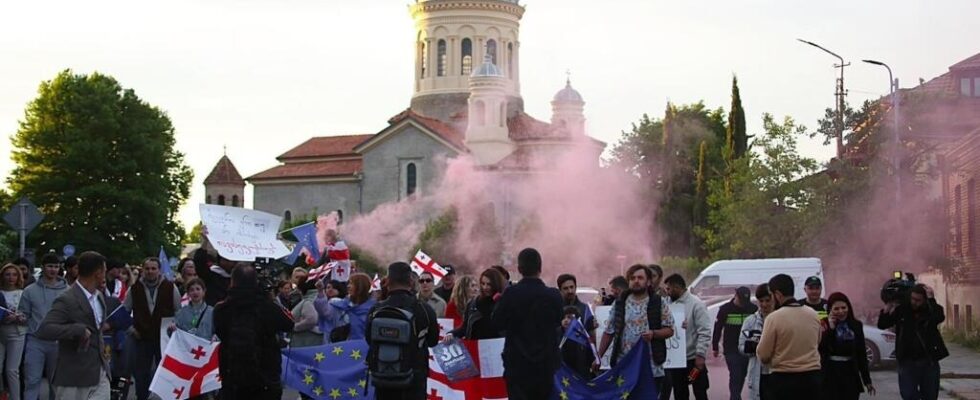In Georgia, mobilization continues against the law on foreign influences. A law passed definitively this week and which requires NGOs and the media to declare themselves to the authorities if they receive more than 20% of their budget from abroad. A law denounced by demonstrators who mobilize massively and daily in Tbilisi. Outside, 80 kilometers from the capital, in Gori, mobilization is less extensive and more difficult.
From our special correspondent in Gori,
“ Gori was bombed by the Russians in 2008 and then it was rehabilitated with the help of Europe and the United States. We must never forget that! » It is in a small square in Gori that we meet Teona Pahnkvelashvili, an opposition activist mobilized from the first day against the law on foreign influences. “ This law is a copy and paste of the Russian law on foreign agents and we have seen the consequences! That’s why I’m against it. »
On her cell phone, Teona shows us images of the three demonstrations organized in Gori since April. A reason for pride, in a city where it is very difficult to mobilize: “ Students are afraid of being suspended, in companies, people are afraid of losing their jobs, because the bosses here are pro-Russian… and therefore people do not dare to demonstrate. »
Teona is not afraid, however since the beginning of the movement. She was the subject of threats and insults. “ They called me in the middle of the night, they told me: “Don’t organize the demonstration otherwise we’ll hurt you a lot! to you and your family.”
In Gori, not everyone looks favorably on these students who demonstrate in Tbilisi against the law on foreign influences. Gouliko and Zviad, one retired, the other a 57-year-old karate teacher, fully approve of this legislation: “We had to do it even before because we have to know where the funding comes from and why it comes. The demonstrations you are seeing now in Tbilisi, what do you think, who is it financed by? “, asks Gouliko. And for Ziad, this 57-year-old karate teacher justifies his position: “ These NGOs, if they do good things, why are they hiding? But if they do bad things, if they try to destabilize the government, of course they have to say so! “.
Freedom of expression in danger
What Gouliko and Zviad don’t know is that with this law one of Gori’s most active cultural centers may be forced to close. No more exhibitions financed in large part by European funds, a heartbreak for Oto Guritshvili, member of the Art House collective: “ We don’t know how things will work with the law so for the moment, we have frozen all our grant applications. Europe or Russia, we are once again faced with this choice: on one side the rule of law, on the other the mafia. It’s a vicious circle from which we can’t escape. »
In 2008, Oto remained in Gori, bombed and then occupied by the Russian army and for him this law on foreign influences is a bit like the return of Russia to Georgia. Without the armored vehicles or the planes, but with the same objective: to distance his country from Europe, and to anchor it to its zone of influence.
Also read or listenGeorgia: a tipping point?
